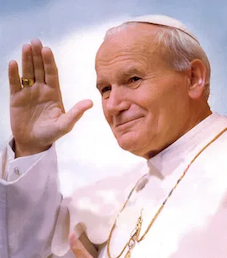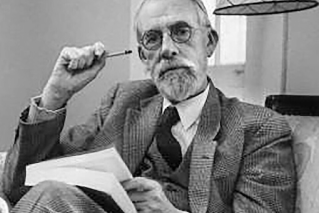Ian Linden: Navigating nationalism, patriotism and populism

St Pope John Paul II
A while ago, sticking to his imposition of tariffs, President Trump evoked stirring political pronouncements. We are entering a 'new era' Sir Keir Starmer declared. It still looks that way. A Treasury Minister announced the end of globalization. Perhaps splitting into two trading networks is underway. But where is guidance for alternatives to the current hijacking of the global economy to be found? What is the relationship between the populism, nationalism and 'patriotism' that put this man in power again?
As a matter of fact, a new era began years ago. Communications technology was, and is, one of the driving forces transforming the economy. IT has had consequences for who profits and who loses, power relations, and our experience of social relations. US populism, a bizarre sub-species of extreme nationalism, Trump and Maga mania, are a further element. And the second coming of Trump is associated with seismic geo-political changes.
The social experience and perceptions of many people living in democracies is easily summed up. They feel ignored by the dominant political Parties, believing "they are all the same" and that votes change nothing. They feel humiliated by an urban elite perceived as not so much a meritocracy as an oligarchy.
Because of lack of control over immigration, for right-wing populists, jobs, culture and identity are put in jeopardy by foreigners/immigrants, ethnic minorities and Muslims. Reform picks and mixes its exploitation of these fears. For Left-wing populists, for example Syriza in Greece, Podemos in Spain, the primary rallying point is characteristically failure to tackle inequality and injustice.
None of the sentiments above is news. There have been acres of newsprint and critical scholarly analysis spent on them. The problem is that the weltanschauung of populist extreme nationalism cuts the ground from under its critics. The reply is usually "they would say that wouldn't they" - because "they" belong to the urban elite, an oligarchy, and are the beneficiaries of the status quo. They are responsible for and sustain these wrongs. Enter from both right and left the jokers and budding dictators around the world who alone, it is - naively - hoped, may bring about change.
Inasmuch as the politics of the West still rests on the values implied in a culture of human rights or human dignity, there are ways into a conversation with extreme nationalists. Though damaged by sexual abuse scandals, the Churches retain the capacity to play an important part in this conversation because they are often felt to stand above a venal interest in the status quo. They still have a voice.
The Acts of the Apostles describes how the early Christian community distinguished itself from the religion of the bounded territory and culture represented at the time by Judaism. It was a momentous decision, obviously debated, which only in the 20th Century produced a truly global Church. It gave to Christian thought a tension between its universality and different national and cultural identities, and eventually a nuanced view of nationalism.
The Church has praised a healthy love of country in encyclicals and papal speeches. And, during the last thirty years, the Vatican has spoken out against extreme nationalism. Pope Francis gave a typically strong speech to a plenary session of the Pontifical Academy of Social Sciences, advisers to the Vatican, on 2 May 2019. "States become subservient to the interests of dominant groups, mostly for economic profit, who oppress - among other things - ethnic linguistic or religious minorities", he said. They "stir up nationalistic sentiments in its people against other nations or groups". This "confrontational nationalism that puts up walls", he added, creates "aggressive currents against foreigners, especially immigrants". He might have been describing the American State under Trump.
As is characteristic of Catholic social teaching, questions about nationalism are set in the context of the common good. For Francis "the common good for its people is not possible by itself". "The common good has become global and nations must come together for their own benefit". Though he notes the tension between globalization which "seeks to eliminate and smother local identities" and globalization that embodies the Christian principles of reconciliation, unity and solidarity. It is the duty of Western democracies to navigate these tensions not intensify them.
Pope John Paul II, whom most people would assume had a soft spot for Polish nationalism, makes helpful distinctions between nationalism and patriotism. "True patriotism", he told the UN General Assembly in an address on 5 October 1995, "never seeks to advance the well-being of one's own nation at the expense of others". It should be imbued with the "spirit of peace, respect and solidarity". His conclusion was: "Nationalism, particularly in its most radical form, is thus the antithesis of true patriotism" - which he sees as implying the duty to love "our native land". Like Francis, John Paul II doesn't ignore tensions between the particular and universal in a global Church (for believers a tension resolved only in the Eucharist). American Catholics particularly would benefit from reflecting on his speech.
Both speeches speak to our condition today. Trump's blanket tariff coverage will, of course, have devasting effects on the economy of poor countries, and, by creating inflation, on the poor generally. There is one line in John Paul II's General Assembly speech some 30 years ago that is particularly pertinent. "The international economic scene needs an ethic of solidarity, if participation, economic growth, and a just distribution of goods are to characterize the future of humanity", he said. Such pronouncements in the public forum stem from a religious, not a political, motivation.
To read on see: www.ianlinden.com/latest-blogs/navigating-nationalism-patriotism-populism
Professor Ian Linden is Visiting Professor at St Mary's University, Strawberry Hill, London. A past director of the Catholic Institute for International Relations, he was awarded a CMG for his work for human rights in 2000. He has also been an adviser on Europe and Justice and Peace issues to the Department of International Affairs of the Catholic Bishops Conference of England and Wales. Ian chairs a new charity for After-school schooling in Beirut for Syrian refugees and Lebanese kids in danger of dropping out partnering with CARITAS Lebanon and work on board of Las Casas Institute in Oxford with Richard Finn OP. His latest book was Global Catholicism published by Hurst in 2009.


















